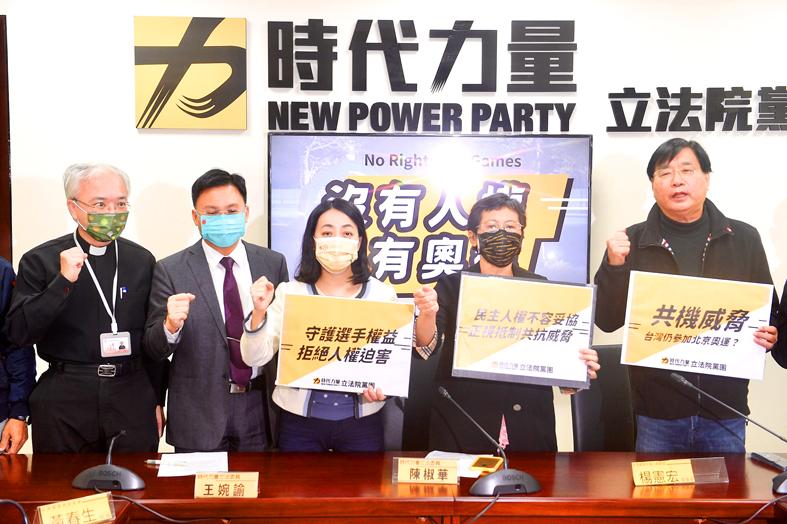New Power Party (NPP) lawmakers and human rights groups yesterday talked about Taiwan boycotting next year’s Winter Olympics in China, but the legislative resolution they proposed fell short.
China “is not fit to be the host country of the Olympic Games” given its long history of human rights abuses and disregard for democratic values, NPP Chairwoman Chen Jiau-hua (陳椒華) told a news conference.
Beijing has also frequently sent People’s Liberation Army aircraft into Taiwan’s air defense identification zone to exert military pressure on the nation, she said, calling on other parties to support a resolution put forth by the NPP earlier this month.

Photo: George Tsorng, Taipei Times
However, the proposal only urges the Cabinet to “carefully assess and pay attention to international efforts to boycott the 24th Winter Olympics in Beijing in 2022, and come up with a correct response at an appropriate time.”
It is scheduled to be discussed in cross-party negotiations.
Chen said it is important for Taiwan to take a stance on the Winter Games, which are to be held from Feb. 4 to 20, because it participates in the international community.
Although Taiwan is a small country, it should uphold its fundamental values, such as democracy and human rights, she said.
Taiwan Association for China Human Rights founder Yang Sen- hong (楊憲宏) said the main goal of the proposed resolution is to pressure the Cabinet to take a stance on the Beijing Olympics, stand with other democratic countries and address the Winter Games in ways that are aligned with the international community.
Human rights organizations around the world have been calling on democratic governments to diplomatically boycott the Games as a means to protest the human rights situations in Xinjiang, Tibet and Hong Kong.
A diplomatic boycott would mean that no high-level government officials would be sent to Beijing.
A boycott of the Beijing Games would not have major consequences for Taiwan. Considering the poor relations between Taipei and Beijing, Taiwanese government officials are unlikely to attend.
Taiwan traditionally sends few athletes to the Winter Games, having only sent four to Pyeongchang, South Korea, in 2018 and three to Sochi, Russia, in 2014. It is not yet clear how many will qualify for Beijing.
NPP Legislator Wang Wan-yu (王婉諭) said her party and the human rights groups support Taiwanese athletes competing in international competitions, but at the same time believe it equally important to speak out on human rights issues.
“If we wish to protect athletes, we should not be afraid to speak out” against China, Wang said, referring to the alleged disappearance of Chinese tennis star Peng Shuai (彭帥) after she accused former Chinese vice premier Zhang Gaoli (張高麗) of sexual assault last month.
Although the International Olympics Committee said in a statement on Nov. 21 that Peng “was doing fine,” there are still concerns about her safety and well-being.

Taiwan has received more than US$70 million in royalties as of the end of last year from developing the F-16V jet as countries worldwide purchase or upgrade to this popular model, government and military officials said on Saturday. Taiwan funded the development of the F-16V jet and ended up the sole investor as other countries withdrew from the program. Now the F-16V is increasingly popular and countries must pay Taiwan a percentage in royalties when they purchase new F-16V aircraft or upgrade older F-16 models. The next five years are expected to be the peak for these royalties, with Taiwan potentially earning

STAY IN YOUR LANE: As the US and Israel attack Iran, the ministry has warned China not to overstep by including Taiwanese citizens in its evacuation orders The Ministry of Foreign Affairs (MOFA) yesterday rebuked a statement by China’s embassy in Israel that it would evacuate Taiwanese holders of Chinese travel documents from Israel amid the latter’s escalating conflict with Iran. Tensions have risen across the Middle East in the wake of US and Israeli airstrikes on Iran beginning Saturday. China subsequently issued an evacuation notice for its citizens. In a news release, the Chinese embassy in Israel said holders of “Taiwan compatriot permits (台胞證)” issued to Taiwanese nationals by Chinese authorities for travel to China — could register for evacuation to Egypt. In Taipei, the ministry yesterday said Taiwan

Taiwan is awaiting official notification from the US regarding the status of the Agreement on Reciprocal Trade (ART) after the US Supreme Court ruled US President Donald Trump's global tariffs unconstitutional. Speaking to reporters before a legislative hearing today, Premier Cho Jung-tai (卓榮泰) said that Taiwan's negotiation team remains focused on ensuring that the bilateral trade deal remains intact despite the legal challenge to Trump's tariff policy. "The US has pledged to notify its trade partners once the subsequent administrative and legal processes are finalized, and that certainly includes Taiwan," Cho said when asked about opposition parties’ doubts that the ART was

If China chose to invade Taiwan tomorrow, it would only have to sever three undersea fiber-optic cable clusters to cause a data blackout, Jason Hsu (許毓仁), a senior fellow at the Hudson Institute and former Chinese Nationalist Party (KMT) legislator, told a US security panel yesterday. In a Taiwan contingency, cable disruption would be one of the earliest preinvasion actions and the signal that escalation had begun, he said, adding that Taiwan’s current cable repair capabilities are insufficient. The US-China Economic and Security Review Commission (USCC) yesterday held a hearing on US-China Competition Under the Sea, with Hsu speaking on